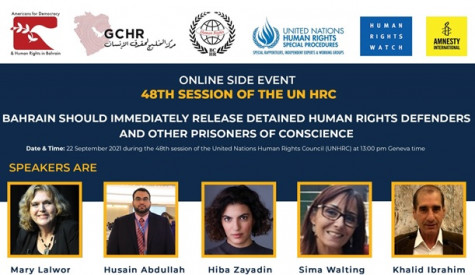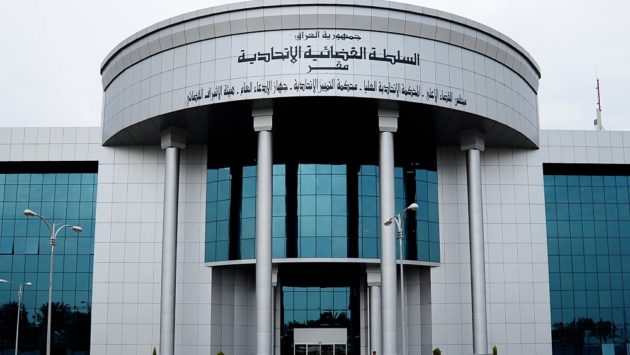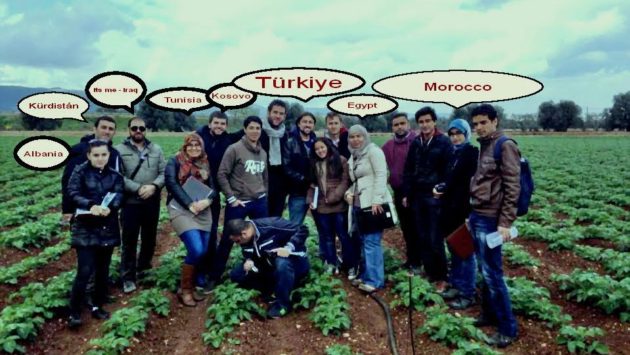GCHR Activities During UN Human Rights Council’s 48th Session
The Gulf Centre for Human Rights (GCHR) was involved in various advocacy activities during the 48th session of the United Nation’s Human Rights Council (UNHRC) in Geneva, which ran from 13 September to 11 October 2021. GCHR organized and participated in five online side events and meetings to carry out advocacy to enhance the protection of human rights defenders and defend public freedoms in the Middle East and North Africa (MENA) region.
Side Event 1 – Bahrain should immediately release detained human rights defenders and other prisoners of conscience, 22 September 2021
Co-Sponsors: GCHR, American for Democracy & Human Rights in Bahrain (ADHRB), Bahrain Centre for Human Rights (BCHR), Amnesty International, and Human Rights Watch.
At this well-attended event, Mary Lawler, UN Special Rapporteur on the situation of human rights defenders (HRDs), focused on HRDs who had been detained in Bahrain for more than ten years, often under terrorism or national security grounds. She stressed that terrorism laws cannot be used to stop peaceful speech and association. She noted that the Bahraini Mission in Geneva had been open to hearing her concerns but did not agree. Among those imprisoned are HRDs that Lawlor knows personally: Abdulhadi Al-Khawaja, co-founder of BCHR and GCHR, Naji Fateel, and Dr. Abduljalil Al-Singace.
Husain Abdullah of ADHRB stressed the value of UN special procedures and noted that their decisions and statements have led to concrete improvements such as stopping torture, improved medical attention, or family visits. Furthermore, detainees often used hunger strikes to push for improvements, including Al-Khawaja and currently Al-Since, who has been on hunger strike since 08 July 2021 to protest poor treatment in prison. HRDs and their families also suffered reprisals even when free, such as the revoking of citizenship. Pressure works and consequences such as those from “Magnitsky-style” acts can be effective.
Hiba Zayadin of Human Rights Watch noted that detention conditions included death following the denial of medical care, and two covid outbreaks have been reported in prison. Sima Watling of Amnesty noted that ten years after the initial calls for political reform, freedom of expression has been shut down, the results of the independent inquiry in 2011 ignored as have most of the 133/175 UPR recommendations accepted by the Bahraini government. Bahrain’s allies stay silent, apparently for defense and security considerations. Khalid Ibrahim, GCHR’s Executive Director, moderated the event.
Side Event 2 – Campaign to stop Private Israeli spy software Pegasus, 23 September 2021
Khalid Ibrahim participated in this online event organized by Skyline International for Human Rights in which he talked about the need to protect human rights defenders against any digital threat such as those revealed by the Pegasus Project and talked about the important role of the MENA Coalition to Combat Digital Surveillance in ending the trade between companies and oppressive governments. Other speakers were: Sherif Mansour, MENA Program Coordinator, Committee to Protect Journalists (CPJ), Marwa Fatafta, MENA Policy Manager at Access Now, and Daniel Rivera, Director of Skyline International, who was the Moderator.
Side Event 3 – UAE and INTERPOL: Maj. General Ahmed Naser Al-Raisi is not qualified to be the president of INTERPOL, 28 September 2021
At this event, which highlights advocacy by GCHR and Human Rights Watch, among other partners, Hiba Zayadin outlined UAE’s human rights record that makes it one of the worst violators globally. Massive surveillance and detention followed by torture and conviction have shut down any criticism of the government inside the country. The UAE has used its vast wealth to whitewash its reputation. Inès Osman of MENA Rights Group noted that while INTERPOL helps fight terrorism, in the UAE this includes peaceful protest. The laws used have no clear criteria and administrative detention can keep detainees outside court proceedings for lengthy periods.
British barrister Rhys Davis, of Temple Garden Chambers, noted that the INTERPOL election process is opaque with candidates only announced at the selection meeting. The UAE is one of the top ten abusers of Red Notices, using them to seek the extradition of opponents. Furthermore, the personal record of the UAE’s candidate, Al-Raisi, is tainted at the least by his personal involvement with the case of British researcher Matthew Hedges, who was tortured in detention in the UAE, and his responsibility for serious human rights abuses. Starting in 2015, the UAE began massive donations to INTERPOL, becoming one of the largest donors in recent years, raising the question of whether this is a case of buying influence.
Amélie Lefebvre, the French human rights lawyer, advised that a court case had been filed by GCHR in France against Al-Raisi under universal jurisdiction, for the inhumane conditions in which human rights defender Ahmed Mansoor, GCHR’s Advisory Board member, is currently detained. France has strong legislation under torture, and a case could proceed if Al-Raisi enters the country, although a prosecutor would have to agree. INTERPOL is headquartered in France. Khalid Ibrahim, GCHR, Moderator noted that there was a united call that neither the UAE nor its candidate is qualified to lead the world police organization.
Side Event 4 – Saudi Arabia: Taking stock of limitations of recent human rights reforms, 05 October 2021
During the event, Joshua Cooper of ALQST summarised a report submitted by ALQST, Martin Ennals Foundation and GCHR on the lack of progress at the mid-term stage of the Universal Periodic Review (UPR) recommendations to Saudi Arabia in 2018 for the 2023 UPR, including those accepted by Saudi Arabia. He highlighted a lack of progress on treaty adherence, accepting visits by UN Special Procedures, impunity by security forces, the use of coerced confessions including torture, use of the death penalty including on minors, and the limits of certain reforms on women’s rights that are countered by other existing limitations.
Activist Lina Alhathloul, the sister of Loujain Alhathloul who is a Martin Ennals Award Finalist in 2021, spoke of the severe impacts of travel bans that are used against HRDs and their families. Often those banned only learn of the ban when trying to leave or upon their return. The lack of a defined procedure means there is nowhere to challenge it. They are often a step prior to detention and it hangs over them like Damocles’ sword and they are then silenced through fear. The collective nature of the punishment leads to social isolation as they are shunned by fearful family and friends. She called for travel bans to be included in calls to lift restrictions on HRDs.
Dana Ahmed of Amnesty International spoke about the resumption of the use of the death penalty in Saudi Arabia after a pause in 2020 due to COVID-19, many after unfair trials including confession through torture. She further noted that HRDs who have been released often have travel bans and restrictions on speech, so they are not really free.
Side Event 5 – The importance of documenting human rights violations in order to achieve accountability, justice, and end impunity – Iraq, 07 October
Co-Sponsored by: GCHR, Iraqi Network for Social Media (INSM), Iraqi Observatory for Human Rights (IOHR), Amnesty International, and the World Organisation Against Torture (OMCT)
The Speakers sent a united call to the Iraqi government to end impunity and held perpetrators of the crimes against peaceful protesters and civil society activists accountable and protect public freedoms. They were Rand Hammoud of Amnesty, Belkis Wille of Human Rights Watch, Hayder Hamzoz of INSM, Achref Afi of OMCT, Mustafa Saadoun of IOHR and GCHR’s Khalid Ibrahim, who served as Moderator.




